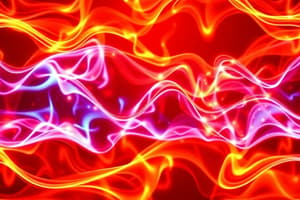Podcast
Questions and Answers
What is the primary focus of the Bible in relation to energy?
What is the primary focus of the Bible in relation to energy?
- To discuss the laws of thermodynamics.
- To describe different types of energy sources.
- To uncover man's God-given identity as a child of Spirit. (correct)
- To explain the scientific principles of energy.
Which type of energy is described as resulting from the flow of electric charge?
Which type of energy is described as resulting from the flow of electric charge?
- Nuclear energy
- Electrical energy (correct)
- Chemical energy
- Mechanical energy
Which of the following units is not associated with energy?
Which of the following units is not associated with energy?
- Calories
- Joules
- Watt-hour
- Volts (correct)
What do all living things require energy for?
What do all living things require energy for?
Which of the following correctly describes mechanical energy?
Which of the following correctly describes mechanical energy?
Which type of compound provides energy to cells and is also stored for energy?
Which type of compound provides energy to cells and is also stored for energy?
How is energy defined in this context?
How is energy defined in this context?
Which of the following elements is not typically found in proteins?
Which of the following elements is not typically found in proteins?
What is one way plants utilize energy from the sun according to the content?
What is one way plants utilize energy from the sun according to the content?
Which law of thermodynamics is associated with the conservation of energy?
Which law of thermodynamics is associated with the conservation of energy?
Which type of organic compound is essential for storing and transmitting genetic information?
Which type of organic compound is essential for storing and transmitting genetic information?
During chemical reactions, what is typically transformed?
During chemical reactions, what is typically transformed?
What is one characteristic of spiritual energy as mentioned in the content?
What is one characteristic of spiritual energy as mentioned in the content?
What type of work does energy primarily do in living organisms?
What type of work does energy primarily do in living organisms?
What is a common misconception about energy according to the content?
What is a common misconception about energy according to the content?
Which of these forms of energy is NOT mentioned as influencing the lives of individuals and nations?
Which of these forms of energy is NOT mentioned as influencing the lives of individuals and nations?
Study Notes
Energy and Chemistry of Life
- Understanding is focused on how living organisms utilize energy, particularly through photosynthesis in plants and energy usage from sugars in other organisms.
- The lesson includes active participation through discussions and responses for quick assessments of comprehension.
Forms of Energy
- Mechanical Energy: Initiates movement in objects.
- Chemical Energy: Stored in molecular bonds of chemical compounds.
- Electrical Energy: Arises from the movement of electric charges.
- Radiant Energy: Energy conveyed through electromagnetic waves.
- Nuclear Energy: Energy present in the nucleus of an atom.
Laws of Thermodynamics
- Conservation of Energy: Energy cannot be created or destroyed, only transformed.
- Energy Units: Understanding the measurements for different forms of energy is crucial in biological and chemical processes.
Organic Compounds and Their Functions
- Carbohydrates: Composed of carbon, hydrogen, and oxygen; provide energy, store energy, and form essential structure in cells.
- Lipids: Store energy, form cellular membranes, and facilitate communication (phospholipids are a key type).
- Proteins: Composed of carbon, hydrogen, oxygen, and nitrogen; essential for maintaining cell shape, muscle composition, accelerating reactions, and transporting materials.
- Nucleic Acids: DNA and RNA; contain genetic instructions for protein synthesis and hereditary information.
Biochemical Reactions
- Example reaction illustrating ionic bond formation: Sodium and chlorine react to form sodium chloride (Na+ Cl2 → NaCl).
Water, Acids, and Bases
- Understanding the roles of water and the properties of acids and bases is essential for biochemical processes and cellular functions.
Summary and Application
- Life processes in bacteria, plants, and animals are fueled by energy necessary for survival and reproduction.
- Practical examples of energy usage in daily life emphasize its omnipresence, from basic movements to operating technology.
Studying That Suits You
Use AI to generate personalized quizzes and flashcards to suit your learning preferences.
Related Documents
Description
Test your understanding of energy forms and their role in the chemistry of life. This quiz covers thermodynamics and the structure and function of organic compounds. Prepare to demonstrate your knowledge of the essential concepts in environmental science.




